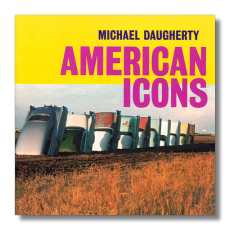
The Internet's Premier Classical Music Source
Related Links
- Daugherty Reviews
- Latest Reviews
- More Reviews
-
By Composer
-
Collections
DVD & Blu-ray
Books
Concert Reviews
Articles/Interviews
Software
Audio
Search Amazon
Recommended Links
Site News
 CD Review
CD Review
Michael Daugherty

American Icons
- Dead Elvis 1
- Snap! 2
- What's That Spell? 3
- Jackie's Song 4
- Le Tombeau de Liberace 5
- Motown Metal 6
- Flamingo 7
1 Charles Ullery, bassoon
3 Lisa Bielawa & Alex Sweeton, vocalists
4 Christopher van Kampen, cello
5 Paul Crossley, piano
1,6,7 London Sinfonietta/David Zinman
2,5 London Sinfonietta/Markus Stenz
3 Dogs of Desire/David Alan Miller
4 London Sinfonietta/Michael Daugherty
Argo 458145-2 DDD 67:27
Iowa-born composer Michael Daugherty is infatuated with American pop culture. On CD, one can already hear his symphony about Superman (Metropolis Symphony) and his opera about Jacki Kennedy/Onassis (Jackie O). Now, Argo has released this collection of seven shorter works, each of them paying tribute – often with irony – to people and things also regarded the world over as typically American.
Little of the music on this disc goes beneath the surface. One senses that this was entirely what Daugherty had in mind, although wouldn't it have been interesting if he had helped us to understand why Elvis Presley and Liberace, to name just two, were American icons? Daugherty seems to make a virtue of superficiality, which is not so surprising, because this also seems typically American to me.
"If you want to understand America and all its riddles," writes Daugherty, "sooner or later you will have to deal with (Dead) Elvis." That may be so. The composer deals with him by having a bassoonist play variations on the plainchant Dies Irae, with a little bit of "O Sole Mio" thrown in for good measure. The orchestra makes dry comments in the idiom of Stravinsky's L'histoire du soldat, or maybe John Adams's Chamber Symphony. The question remains, though: why a bassoon?
Snap! is a tribute of sorts to Jimmy Cagney, whose whose spatially complex dance in the movie Something to Sing About inspired Daugherty to write a spatially complex piece; two cymbal players are separated by the chamber ensemble, and this sets up interesting stereophonic effects. The material is brassy and jazzy – just like Cagney's performance – but not as innocent.
The anatomically improbable Barbie is the subject of What's That Spell?. (The title alludes to a call commonly used by cheerleaders.) Here, the "cheerleaders" are two cool and virginal "Barbie-sopranos" who celebrate themselves and their various play roles (ballerina, drum majorette, girlfriend of Ken) against a pop-rock instrumental background. Again, it's a clever composition, although it keeps the listener firmly at an arm's length.
The emotional center of the disc is Jackie's Song, the composer's warm-up to Jackie O. It's a brief elegy for solo cello and chamber orchestra, punctuated by a snare drum rim-shot, which must represent the shooting of John Kennedy. Among the works on this CD, it is only in Jackie's Song that Daugherty lets the mask down a little, and lets us get inside of the music and the subject matter.
Le Tombeau de Liberace is a mini-piano concerto in four movements. Perhaps predictably, these are titled "Rhinestone Kickstep," "How Do I Love Thee?," "Sequin Music," and "Candelabra Rhumba." The soloist is required to ape Liberace's histronic virtuosity, and it's probably all Paul Crossley can do not to stop in the middle of it all and comment, "I wish my brother George was here." Like its subject, Le Tombeau de Liberace is a tour de force of shallowness – surface triumphant, if you will. How interesting it would have been if Daugherty's work had helped us to explain the Liberace phenomenon!
Trombone slides like the revving of engines open Motown Metal, a work for brass ensemble and percussion that nominally alludes to Detroit, but that more generally seems to pertain to America's all-consuming passion for the automobile. With its shiny orchestration and funky rhythms, Motown Metal is as exciting as a day at the Indianapolis 500. Flamingo probably is the only piece of classical music written about a lawn ornament; in 1962, young Michael saw them for the first time as the family station wagon entered Miami. In this work, Daugherty repeats the spatial pattern he used in Snap!, this time replacing the cymbals with tambourines, and riffing on ideas taken from Spanish flamenco dancing.
American Icons is entertaining. However, it's about as nutritious as American fast food. Again, this is not intended as a put-down. I believe Michael Daugherty is capable of digging more deeply into the human condition. For now, anyway, he is content to be the jokester, and why not, because he is very good at it. Performances, I assume, are definitive, and Argo's presentation is cheerfully vulgar… which seems about right to me.
Copyright © 1999, Raymond Tuttle



















